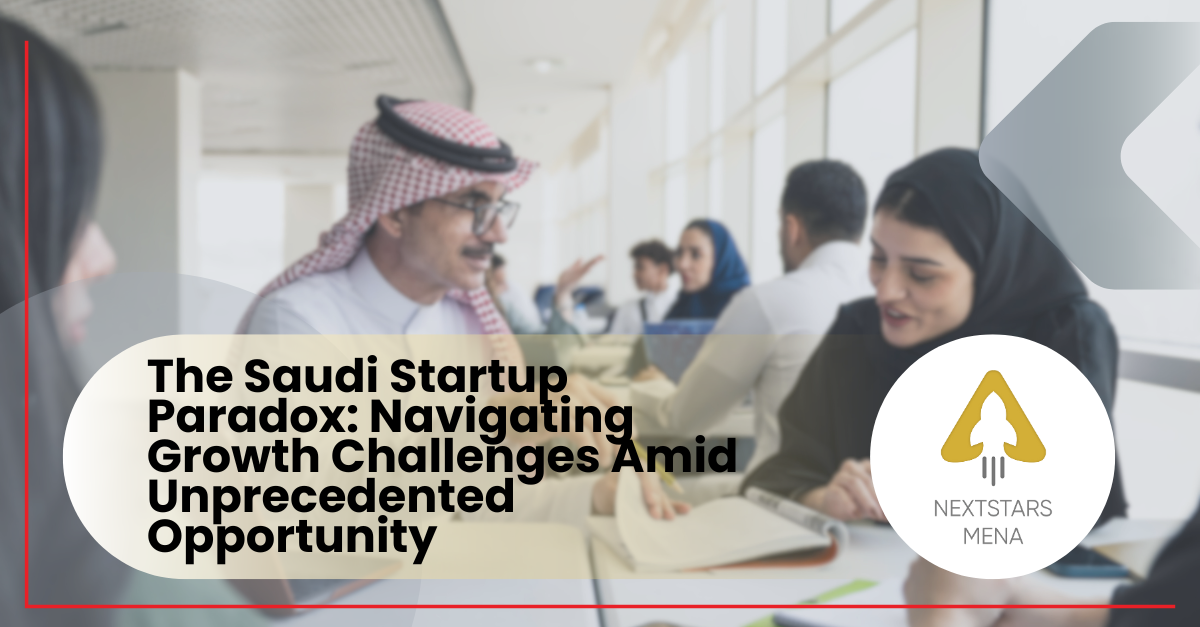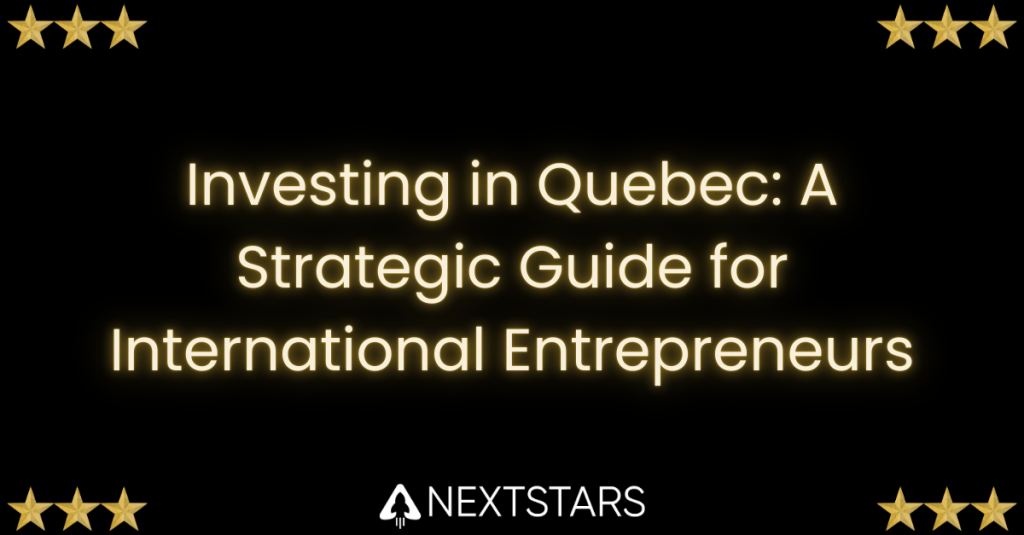Insights from NextStars’ work building bridges between Canadian innovation and MENA markets
Over the past year, NextStars has been deeply engaged in Saudi Arabia’s startup ecosystem, working to connect international entrepreneurs with the Kingdom’s Vision 2030 ambitions. What we’ve discovered is a landscape rich with potential but grappling with challenges that capital alone won’t solve.
Here’s what we’re observing and how we’re thinking about these obstacles as we build NextStars MENA.
The Capital Paradox: Too Much Money, Not Enough Access
Saudi Arabia isn’t starving for capital. The Public Investment Fund, Wa’ed Ventures, and numerous family offices have created one of the most well funded innovation environments in the emerging world. Yet early stage founders particularly those without established networks or previous exits consistently tell us the same story: they can’t access this capital when they need it most.
The disconnect is structural. Institutional investors seek de risked opportunities with proven traction and clear paths to scale. First time founders need believers who understand that product market fit is a discovery process, not a checkbox. This is precisely where programs like NextStars become essential. We provide the technical development, business model validation, and traction milestones that make founders investment ready, not just idea ready.
Talent: The Real Constraint
Through our conversations with Saudi founders and ecosystem builders, one theme emerges consistently: talent acquisition is brutal. Startups compete against government initiatives, petrochemical giants, and multinational corporations that offer packages no early stage venture can match. Add Saudization requirements that prioritize nationals for key positions, and you have a perfect storm.
But here’s what makes this particularly complex: it’s not just about salary competition. Saudi Arabia has talented professionals with international experience from top universities and global companies. Many want to return home and contribute to Vision 2030’s transformation. The question is whether they’ll join startups or take safer positions with established entities.
This is where NextStars’ model of bringing international entrepreneurs to build in Saudi creates interesting dynamics. We’re not just importing talent temporarily. We’re creating knowledge transfer mechanisms where international founders train local teams, build institutional capabilities, and eventually transition leadership to Saudi nationals who’ve learned by doing, not just by degree.
Redefining Failure in a Success Oriented Culture
One of the most fascinating challenges has nothing to do with regulations or capital and everything to do with culture. Saudi society values achievement, stability, and established success. Entrepreneurs who fail face questions not just in boardrooms but at family gatherings and social events. This isn’t unique to Saudi Arabia, but the intensity creates real psychological barriers.
We’ve seen promising founders pursue conservative business models because bold experimentation feels too risky from a social capital perspective. We’ve watched talented individuals stay in corporate roles despite entrepreneurial ambitions because the downside of failure extends far beyond their bank accounts.
The ecosystem needs safe spaces to fail forward. This means accelerators and venture studios like NextStars that absorb some failure risk by providing resources, expertise, and structured experimentation. It means celebrating learning publicly and building communities where “pivots” are understood as strategic evolution, not admission of defeat.
The Post Accelerator Void
Saudi Arabia has successfully attracted international accelerators and built impressive innovation districts. Entrepreneurs can access world class programming, mentorship, and initial funding. Then they graduate. And often, they hit a wall.
What happens between accelerator graduation and Series A? Who provides hands on operational support during the messy middle when product market fit is emerging but not proven? Where do founders turn when their initial traction stalls and they need strategic recalibration?
At NextStars, we’ve designed our 12 to 24 month programs specifically to fill this void. We don’t just run founders through curriculum and send them out. We build companies alongside them, providing technical development, strategic guidance, and network access through the critical scaling phase. This is what Saudi startups need more of: committed partners, not transactional programs.
The GCC Expansion Challenge
Here’s an irony: Saudi startups should have natural advantages expanding across the GCC. Shared language, cultural similarities, and geographic proximity should make regional scale straightforward. In practice, it’s surprisingly difficult.
Each GCC country has different regulatory requirements, business registration processes, and market dynamics. What works in Riyadh doesn’t necessarily translate to Dubai or Doha. Cross border payments remain complex. And perhaps most critically, venture capital willing to back Saudi based companies expanding regionally is limited.
NextStars’ approach focuses on building global ready companies from day one. Whether a startup is based in Toronto or Riyadh, we help founders think about international expansion strategically, design for regulatory flexibility, and build partnerships that create market access beyond their home base. For Saudi startups, this often means thinking beyond the GCC entirely, targeting markets where their solutions have genuine competitive advantages.
The Corporate Partnership Gap
Saudi Arabia’s large corporations and family conglomerations should be startup accelerators. They have distribution, customer relationships, industry expertise, and capital. Yet meaningful corporate startup collaboration remains rare.
Why? Corporate cultures optimized for operational excellence in traditional industries struggle with the ambiguity startups bring. Procurement processes designed for established vendors can’t accommodate three person teams building minimum viable products. Innovation theaters get built, but genuine partnership mechanisms that create value for both parties are harder to find.
This represents one of the biggest opportunities for ecosystem development. NextStars works to create structured pathways between our portfolio companies and corporate partners, facilitating pilots that prove value quickly and create reference cases that de risk future partnerships.
Building Solutions, Not Just Highlighting Problems
These challenges are real, but they’re also solvable. Here’s how we’re thinking about solutions through NextStars MENA:
Creating patient capital pathways. By building companies through longer programs that create genuine traction, we make them attractive to later stage investors while reducing early stage risk.
Enabling talent circulation. Our model brings international entrepreneurs who train local teams, creating knowledge transfer that builds ecosystem capabilities over time.
Normalizing experimentation. By providing safe environments to test, learn, and pivot, we help shift cultural narratives around entrepreneurial risk.
Building regional bridges. Our portfolio companies are designed for global markets from inception, which means thinking beyond geographic constraints.
Facilitating corporate innovation. We structure partnerships that create win win scenarios, proving value quickly and building trust iteratively.
Why This Matters Beyond Saudi Arabia
The challenges we’re seeing in Saudi Arabia aren’t unique to the Kingdom. They appear in different forms across emerging ecosystems worldwide. The solutions we’re building through NextStars MENA have applications far beyond one market.
This is what excites us about the work: we’re not just building startups. We’re building the connective tissue that makes ecosystems function, the knowledge transfer mechanisms that create lasting capabilities, and the partnership models that turn resource rich environments into innovation powerhouses.
Saudi Arabia has the ingredients for world class entrepreneurship: capital, government support, ambitious talent, and massive market opportunities. What it needs now are operators committed to the hard work of ecosystem building, the patient capital willing to back learning curves, and the international partnerships that accelerate knowledge transfer.
That’s exactly what NextStars is here to do.
NextStars is expanding into MENA markets with comprehensive programs that transform ideas into climate conscious global companies. We’re currently building partnerships across Saudi Arabia aligned with Vision 2030 initiatives. If you’re interested in learning more about our work or exploring collaboration opportunities, reach out.





